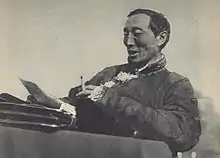Donduk Kuular
Donduk Kuular (Tuvan: Куулар Дондук, [kuːˈlɑr dɔnˈduk], 1888–1932) was a Tuvan monk, politician, and prime minister of the Tuvan People's Republic.
Donduk Kuular | |
|---|---|
Куулар Дондук | |
 | |
| Chairman of the Council of Ministers of the Tuvan People's Republic | |
| In office 1925–1929 | |
| Preceded by | Soyan Oruygu |
| Succeeded by | Adyg-Tulush Khemchik-ool |
| Personal details | |
| Born | 1888 |
| Died | 1932 (aged 43–44) |
| Nationality | Tuvan |
| Political party | Tuvan People's Revolutionary Party |
Born in Tannu Uriankhai, a Qing Dynasty vassal state, that become nominally independent at the fall of Qing dynasty due to 1911 revolution in China, Donduk was originally a Lamaist monk.[1] As leader of a group of Russian-supported Bolsheviks, he proclaimed the independence of the People's Republic of Tannu Tuva from Russian Empire in 1921. He subsequently switched his affiliation to the Tuvan People's Revolutionary Party.
Aware of his young nation's vulnerability, Donduk sought to establish ties with the Mongolian People's Republic. His monastic background and theocratic inclinations gave him a close relationship with the country's lamas, whose interests he sought to advance in spite of Joseph Stalin's growing irritation. In 1926 he established Buddhism as the state religion of Tannu Tuva, which in November was renamed the Tuvan People's Republic.[2]
Stalin found Donduk's separatist and theocratic tendencies obnoxious, and counter to communist principles of internationalism and atheism. In 1929 he was removed from power and arrested. Meanwhile, five Tuvan graduates of the Communist University of the Toilers of the East were appointed commissars extraordinary to Tuva. Their loyalty to Stalin ensured that they would pursue policies, such as collectivization, that Donduk had ignored. A coup was launched in 1929. One of these commissars, Salchak Toka, replaced Donduk as General Secretary of the Tuvan People’s Revolutionary Party. In the same year, Donduk was executed.[3]
References
- Jonathan D. Smele: Historical Dictionary of the Russian Civil Wars, 1916–1926, 2015, Lanham (Maryland) 2015, p. 1197.
- Frank Stocker: Als Vampire die Mark eroberten: Eine faszinierende Reise durch die rätselhafte Welt der Banknoten in 80 kurzen Geschichten, (online) 2015, p. 69.
- Indjin Bayart: An Russland, das kein Russland ist, Hamburg 2014, p. 114.